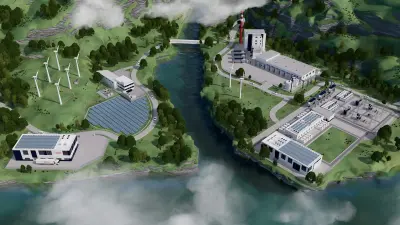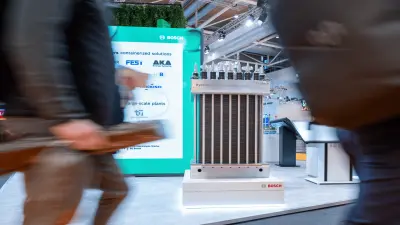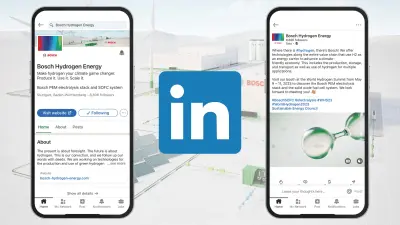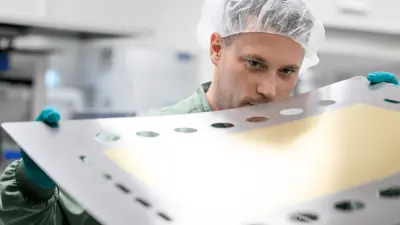EU funding for the industrialization of the PEM electrolysis stack and the smart electrolysis module
Scalable manufacture of the Bosch smart electrolysis module
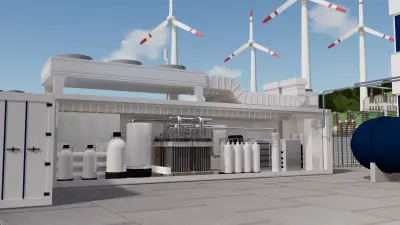
ELYAS stands for “Smart ELectrolYsis Module manufacturing — upscaling with Automotive production technology and a Sustainability focus”. Financed through the EU’s Innovation Fund, the aim of the project is to industrialize the Bosch PEM electrolysis stack and the smart electrolysis module.

At a glance
The basis?
The starting point for the project is the PEM electrolysis stack, which forms the very heart of an electrolyzer. The stack comprises several dozen cells that use electricity to break water down into its component parts of hydrogen and oxygen. The stack produces 23 kilograms of hydrogen per hour, which is equivalent to a power input of up to 1.25 megawatts. The market launch of the stack is planned for 2025.
The next development?
The smart electrolysis module can be regarded as an expansion of the product portfolio. The module combines (at least) one stack with power electronics, a control unit, and sensor technology. The modules are coordinated and optimize system efficiency.
The motivation?
Green hydrogen — in other words, hydrogen that is produced using electricity from renewable sources — is a key element in achieving a low emission energy economy. The Bosch PEM electrolysis stack can be used both for the centralized, high-volume production of hydrogen and in scalable, decentralized systems. The next development in the form of the smart electrolysis module will make it much easier for users to engineer, install, and integrate electrolysis systems and thus support the ramp-up of hydrogen production.

Loading the video requires your consent. If you agree by clicking on the Play icon, the video will load and data will be transmitted to Google as well as information will be accessed and stored by Google on your device. Google may be able to link these data or information with existing data.
The ELYAS project
The ELYAS project (smart ElectroLYsis module manufacturing — upscaling with Automotive production technology with a Sustainability focus) takes a significant step towards a cost- and resource-efficient proton exchange membrane (PEM) stack production, by meeting the highest quality standards for secured long-term running. It is expected that 100% relative greenhouse gas (GHG) emission avoidance will be achieved compared to the reference scenario.
After starting the production of its new Electrolysis stack in 2025, Bosch will industrialize the novel Smart Electrolysis Module (SEM). This combines the electrolysis stack with cost-efficient, robust and highly available automotive-based power electronics, control unit and sensors, including global service offerings.
This pre-assembled and ready-to-use cloud connected system will reduce commissioning efforts of large-scale electrolyzers by up to 80%. It will also significantly increase their operating efficiency and availability. The ELYAS project is designed for rapid scale-up, and the revenue model has been combined with a cloud based AIoT (Artificial Internet of Things) service model. It aims to achieve an absolute GHG emission avoidance of 23.6 million tonnes CO2 equivalent over the first ten years of operation.
The innovative production scheme of the electrolysis stack and the Smart Electrolysis Module is an active and important contribution to climate change technology. The ELYAS project will contribute to the widespread implementation of electrolysis technology which will lead to a significant decrease in fossil fuels dependency.
The first main industrialization site will be Bosch’s Bamberg plant, which is ready to integration hydrogen in addition to automotive products involving experienced and trusted local suppliers. The regional economy of the Bamberg region is largely based on automotive suppliers (this industry provides almost 15,000 jobs in the region). Many of the local companies produce components for combustion engines. Accordingly, in the Bamberg region, the success of the electrolysis stack ramp-up has significant potential for the regional economy. The ELYAS project will accelerate the development of a local supply chain for electrolysis stack manufacturing. Thus, ELYAS will contribute to job creation and generate local added value for the North Bavarian economy.
The Bosch electrolysis stack is currently in the pilot phase. All technical specifications given are development objectives.
Get in touch
Dr. Martin Krugmeister
ELYAS project lead
Contact the Bosch electrolysis team
Funded by the European Union. Views and opinions expressed are however those of the author(s) only and do not necessarily reflect those of the European Union or the European Climate, Infrastructure and Environment Executive Agency (CINEA). Neither the European Union nor the granting authority can be held responsible for them.
